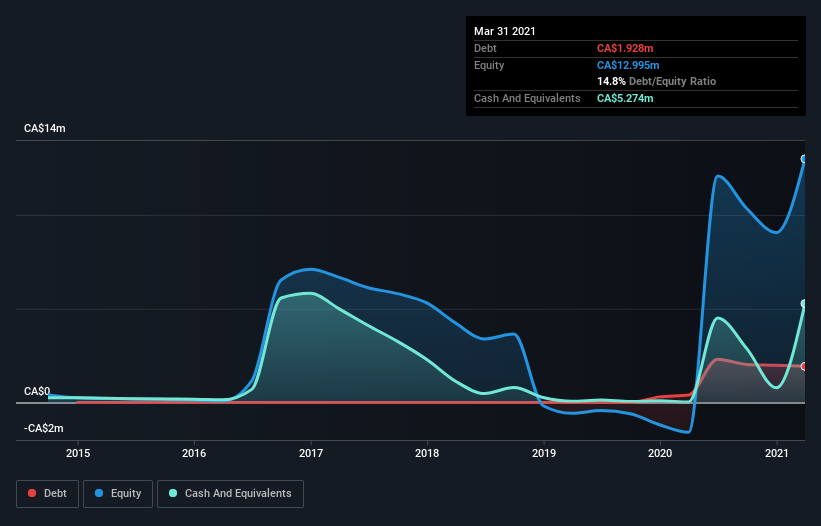David Iben put it well when he said, 'Volatility is not a risk we care about. What we care about is avoiding the permanent loss of capital.' So it might be obvious that you need to consider debt, when you think about how risky any given stock is, because too much debt can sink a company. Importantly, Playgon Games Inc. (CVE:DEAL) does carry debt. But the more important question is: how much risk is that debt creating?
What Risk Does Debt Bring?
Debt and other liabilities become risky for a business when it cannot easily fulfill those obligations, either with free cash flow or by raising capital at an attractive price. Ultimately, if the company can't fulfill its legal obligations to repay debt, shareholders could walk away with nothing. However, a more frequent (but still costly) occurrence is where a company must issue shares at bargain-basement prices, permanently diluting shareholders, just to shore up its balance sheet. Of course, debt can be an important tool in businesses, particularly capital heavy businesses. When we think about a company's use of debt, we first look at cash and debt together.
See our latest analysis for Playgon Games
What Is Playgon Games's Net Debt?
You can click the graphic below for the historical numbers, but it shows that as of March 2021 Playgon Games had CA$1.91m of debt, an increase on CA$400.0k, over one year. But it also has CA$5.27m in cash to offset that, meaning it has CA$3.36m net cash.

A Look At Playgon Games' Liabilities
The latest balance sheet data shows that Playgon Games had liabilities of CA$3.46m due within a year, and liabilities of CA$1.23m falling due after that. Offsetting this, it had CA$5.27m in cash and CA$138.9k in receivables that were due within 12 months. So it can boast CA$729.8k more liquid assets than total liabilities.
This state of affairs indicates that Playgon Games' balance sheet looks quite solid, as its total liabilities are just about equal to its liquid assets. So it's very unlikely that the CA$59.7m company is short on cash, but still worth keeping an eye on the balance sheet. Simply put, the fact that Playgon Games has more cash than debt is arguably a good indication that it can manage its debt safely. The balance sheet is clearly the area to focus on when you are analysing debt. But you can't view debt in total isolation; since Playgon Games will need earnings to service that debt. So if you're keen to discover more about its earnings, it might be worth checking out this graph of its long term earnings trend.
It seems likely shareholders hope that Playgon Games can significantly advance the business plan before too long, because it doesn't have any significant revenue at the moment.
So How Risky Is Playgon Games?
By their very nature companies that are losing money are more risky than those with a long history of profitability. And the fact is that over the last twelve months Playgon Games lost money at the earnings before interest and tax (EBIT) line. Indeed, in that time it burnt through CA$7.3m of cash and made a loss of CA$9.6m. With only CA$3.36m on the balance sheet, it would appear that its going to need to raise capital again soon. Overall, its balance sheet doesn't seem overly risky, at the moment, but we're always cautious until we see the positive free cash flow. The balance sheet is clearly the area to focus on when you are analysing debt. However, not all investment risk resides within the balance sheet - far from it. We've identified 6 warning signs with Playgon Games (at least 3 which are significant) , and understanding them should be part of your investment process.
When all is said and done, sometimes its easier to focus on companies that don't even need debt. Readers can access a list of growth stocks with zero net debt 100% free, right now.
If you're looking for stocks to buy, use the lowest-cost* platform that is rated #1 Overall by Barron’s, Interactive Brokers. Trade stocks, options, futures, forex, bonds and funds on 135 markets, all from a single integrated account. Promoted
New: Manage All Your Stock Portfolios in One Place
We've created the ultimate portfolio companion for stock investors, and it's free.
• Connect an unlimited number of Portfolios and see your total in one currency
• Be alerted to new Warning Signs or Risks via email or mobile
• Track the Fair Value of your stocks
This article by Simply Wall St is general in nature. It does not constitute a recommendation to buy or sell any stock, and does not take account of your objectives, or your financial situation. We aim to bring you long-term focused analysis driven by fundamental data. Note that our analysis may not factor in the latest price-sensitive company announcements or qualitative material. Simply Wall St has no position in any stocks mentioned.
*Interactive Brokers Rated Lowest Cost Broker by StockBrokers.com Annual Online Review 2020
Have feedback on this article? Concerned about the content? Get in touch with us directly. Alternatively, email editorial-team (at) simplywallst.com.
About TSXV:DEAL
Playgon Games
A business-to-business software-as-a-service technology provider, engages in the development and licensing of digital content for the iGaming market in Europe.
Medium-low risk with weak fundamentals.
Market Insights
Community Narratives



